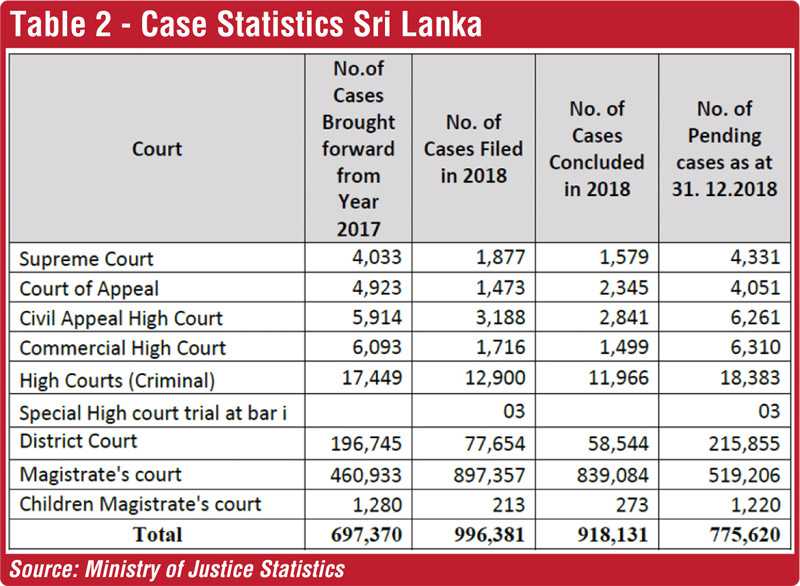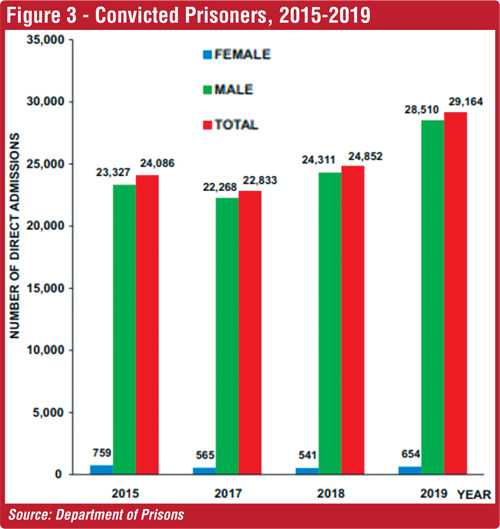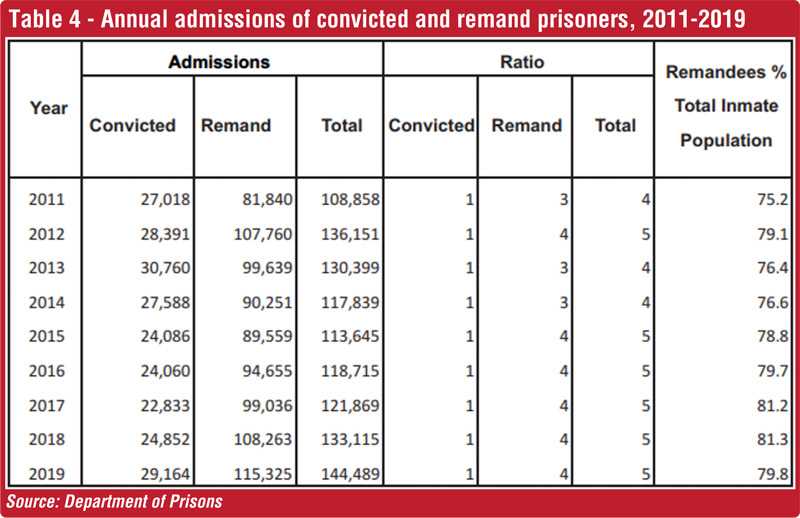Thursday Feb 19, 2026
Thursday Feb 19, 2026
Wednesday, 2 December 2020 00:00 - - {{hitsCtrl.values.hits}}

 Issues faced by legal system in Sri Lanka and impact of COVID-19
Issues faced by legal system in Sri Lanka and impact of COVID-19
Case statistics of Sri Lanka (Table: 2) indicates 775,000 pending cases as of the end of 2018 across all courts, with Magistrate’s Courts and District Courts carrying 95% of the pending cases. “This number, staggering as it is, nonetheless does not adequately show the strain on people desperately waiting for justice. The numbers do not show the pain of the rape victim, the hopelessness of a murder victim’s mother, the businessman desperately waiting to repay debts and the child waiting for his inheritance” (Daily FT, 26 March 2018).
This number keeps on increasing every year and our court system is running out of resources and people will begin to lose faith in the reliability of the judicial system if urgent action is not taken to improve the efficiency of case hearing and judgments.
As per the statistics published by Department of Prisons Table 4 indicates that prison inmates’ numbers have reached 25,000 by 2018 and now it is close to 30,000 convicted inmates serving in prison by 2019 (Figure 3). Table 4 further indicates the annual admissions in Remand prison which has reached over 115,000. It was identified by Table 5 that the convicted inmates’ capacity is overcrowded by 49% while un-convicted inmates are overcrowded by 185.9% by 2019.
The un-convicted population are awaiting the final judgments or bail from their ongoing cases and this number seems to be increasing year on year and due to COVID-19 these inmates will have to wait further extended time in prison due to the pilling up of cases, territorial lockdowns and limited court capacity to address the pandemic crisis. Further there was 183 deaths of prisoners recorded in 2019 and there are very little facilities available in prisons including poor medical attention. This raise further risks if COVID-19 breaks into prisons, there will be adverse consequences.
If we evaluate the court procedure in Sri Lanka, the Judiciary consists of a Supreme Court, a Court of Appeal, High Courts, District Courts and number of Magistrate's Courts (one for each division, as set out in the Administration of Justice Law). In cases of criminal law, the Magistrate's Courts and the High Courts are the only courts with primary jurisdiction.
There is a Commercial High Court only in the Western Province that serves for commercial disputes where debt, damage or claim is above Rs. 5 m (section 2(1), High Court of Provinces (Special Provisions) Act No. 10 of 1996) which is carrying forward 6,310 cases as of the end of 2018 (Table 2). Under the criminal justice system generally the investigations are carried out by Police Department and evidence is analysed by the Government Analysts’ Department while in High Court the prosecutions are by the Attorney General’s Department. The problem is that these entities work independently and it is stated by experienced lawyers that they have experienced long delays of getting reports submitted to the bench of the judges. Further there are piles of documents to be submitted to courts just to begin the proper hearing. This is mainly due to not having an integrated system where the progress is tracked with given deadlines.
In the court system there are inherent traditions that are being carried on from colonial era which have not reformed or any process improvements are visible. It takes long time to initiate a dispute and to start the hearing at courts. While some cases relating to criminal offences, land and property is seen to be dragged on for 10-20 years where some of the parties to the case expire during the trials and before the judgments are given.
If we evaluate a District Court on a given day the writer has experienced that court rooms are full of people in the morning just before the judge comes to the bench and first thing that is seen is future dates are given to the majority of cases, resulting in postponement of the hearings. It is seen that the most common reasons given by respective lawyers are relating to absence of one or more lawyers, witnesses or defendants due to medical reasons or some other matter.
This is experienced very frequently and some cases are just extended twice or thrice continuously without hearing at all and the gap between one hearing date to another is on average three to four months. So the cases get dragged on but every party attached to the case needs to ensure timely payments to lawyers and other administrative offices despite the case just being postponed.
Our court hearing system is open to public and therefore on a given day all the parties related to different cases visit the same congested courtrooms, which is a great threat and must change practice in light of COVID-19. Also it is evident that there is no proper assurance your case will be taken up for hearing or not due to the above reason explained. Even for those cases that are expected to be heard during the day all other people will also have to wait in benches listening to other cases until their turn comes. Therefore it is waste of many productive human hours during a court day.
Further it is observed many prisoners are being transported to court rooms through prison transport for their trials and transported back to prisons based on the judgments. This is another problematic area when considering the spread of COVID-19 and there are greater risks in transporting high profile criminals and we have seen reports of murder of prisoners while they are transported to court and back.
We noted that few days ago during a hearing by Presidential Commission of Inquiry on the Easter attacks, Lieutenant General Mahesh Senanayake was seen attending the court procedure through video conferencing facility from Dubai. This is a benchmarking event in terms of technology adoption for court procedures. Also it was highlighted by media that some video evidence and audio evidence are being played then and there and statements made by the witnesses are cross-examined. These are some of the positive developments that could be introduced as basic standards in the Judiciary procedures.
With the background review of how international context of judicial proceedings have transformed, it is clear that appointment of new courts or increasing number of judges or building new court complexes are not the sustainable solution for this issue. We need to move towards a paperless court room system, adopt case management systems, digitalise court rooms and initiate video links between, prosecutors, prisoners, lawyers and judges, as many other countries have adopted already.
 Roadmap to digitalising court procedures
Roadmap to digitalising court procedures
Definition of ‘digital’ means using internet-based online technologies to improve service quality and it is about using data connectivity and computing more as a tool to improve efficiency and productivity of the judicial system. This doesn’t mean that technology will replace the human interaction but it is about more appropriate use of technology to reach optimal service level.
It is important to understand the main driving forces that should initiate such transformation in the judicial system in Sri Lanka. Without the support of the President and the Government, Parliament and the Ministry of Justice in Sri Lanka, digital transformation is unimaginable and therefore the initiatives should be backed by clear Government policy.
As we have to start the digital transformation from ground level it is learned that in India, UK and other countries have first introduced paperless courts with e-filling and digital document management facility. In order to enable it, digital infrastructure facilities, technical infrastructure, networking, change management and user guidance service needs to be introduced to the court system.
As a pilot project it would be convenient to enable such facility at Commercial High Court of Sri Lanka since it specifically having jurisdiction over commercial transactions over Rs. 5 m and the pool of litigants mainly comprise commercial enterprises and or wealthy individuals. It would be practical to deploy a digital case filling and case lifecycle management system serving for this segment of the country.
When the e-filing is in place digital management of case file can be done through a system which integrates Court, Police, and Attorney General’s department with the relevant links to other authorities such as Government analysis Department and lawyers. So any authorised party could view the case status at a given point of time with access to digital information.
Digital participant identification and participant confirmation system should be implemented so that on a given date and specific time a case could be called over. The hearings may not be postponed and cancelled unless otherwise with prior approval and on-time communication with all the participants to the case. Also courtrooms needs to be equipped with WiFi facilities and LAN, WAN facilities which could connect with above mentioned parties and interact. Mobile applications, SMS and secured e-mail systems could be adopted for communications. Further video conferencing enabled court rooms will be able to get testimonials and litigants would be able to connect from anywhere in the world for a hearing. This technology is prime important for reducing person to person contact and greatly reduce travel time and extra expenditure.
Remote video conference rooms can be established at each prison so that the inmates could attend to the court hearing from the prison itself which cut down the traveling under security and contact with outsiders and avoid the risk of COVID-19 spread as well as improves the efficiency of the court hearing process. Further audio video play options and CCTV footage and other digital data recognition and filling will carry in one digital case file that authorised persons are given access to view.
Lawyers in Sri Lanka hardly use a laptop inside a court room and the transformation of court rooms should facilitate digital file sharing instead of manual document sharing and storing. The court hearing transcripts should be uploaded then and there to the same system and available to public access. Another implementation in the international context that needs to be initiated is the uploading of judgements in to online case management system within the day. This will enable plaintiff or defendants to make online appeals within given deadlines. If they have further concerns about the given verdict. Further a system of e-payments for courts fees and fines would facilitate effective digital transformation.
These facilities could be then be extended to District and Magistrate’s Courts where the majority of carried forward pending cases exists and the majority of new cases being filled at the Magistrate’s Court followed by District Courts. Digitalised case lodging system integrated with a case lifecycle management system that inculcates paperless court hearing culture would greatly improve the efficiency of the whole procedure and will earn public trust where justice is given without undue delay. 
Getting there: Roadmap to success and possible challenges
The road to success depends on many enablers. It is not just the introduction of digital technology that will ensure successful implementation of these strategies. Mainly the President and Government should initiate the transformation as a sustainable solution to improve the efficiency of the legal system of Sri Lanka. The policymakers should re-design the current strategies to align with digitalisation. Therefore policy, legislative, funding, security and public awareness together with online support call centre are some of the key factors.
Further a drastic change in thinking and behaviour needs to be inculcated among all the stakeholder groups. It is important that the different Government departments also given measurable milestones and there should be a setup to evaluate the progress on a regular basis.
The current President and the Government are very much in favour of digitalising and improving digital infrastructure as evident in introducing the online medical test examination appointment system successfully by NTMI recently. The digital transformation should also introduced into the legal system and we welcome the Justice Minister’s intentions for digitalisation and are looking forward to see the implementation in progress.



[The writer, MBA (PIM-USJ), ACMA (UK), CGMA (UK), ACCA Affiliate (UK), ACIM (UK), is a Financial Consultant (Virtualcfo.lk)]